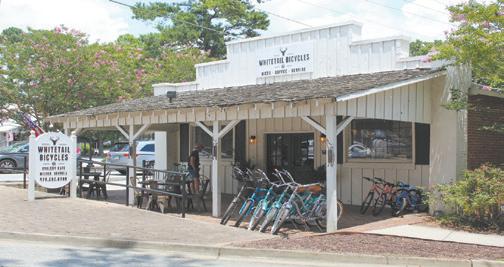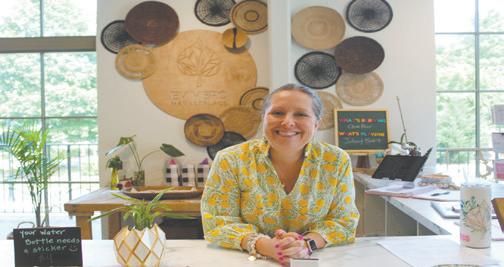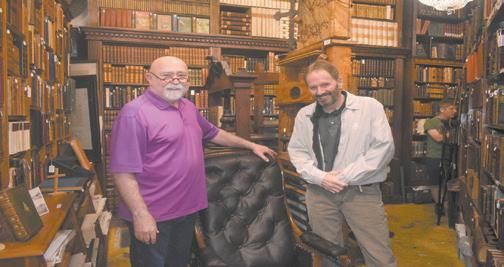In a lawsuit filed with the Fulton County Superior Court, Milton City Councilman Paul Moore seeks to reverse the findings of the Milton Ethics Board from last August, which cited him for three ethics violations. Moore also seeks reimbursement for attorney fees incurred during the panel’s investigation from Tony Palazzo, the Milton resident and White Columns Homeowners Association president who filed the ethics complaint.
Embattled Milton official sues for damages
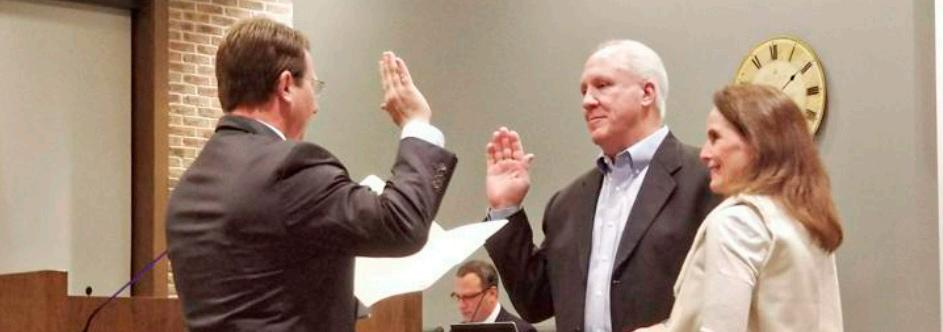

MILTON, Ga. — Milton City Councilman
Paul Moore, found guilty of three ethics violations last August, is suing the resident who filed the complaint.
And the city, which has already shelled out thousands in legal expenses over the issue, has also been named in the case.
The litigation began in November when Moore filed an appeal through a writ of certiorari to the Fulton County Superior Court requesting to reverse the ethics panel findings. The filing stated the three-member Milton Ethics Board ruled in error. Moore also seeks reimbursement


Mayfield area overlay plans taking shape
By AMBER PERRY amber@appenmedia.com
MILTON, Ga. — The District at Mayfield, 22 parcels on nearly 18 acres in Crabapple, is moving closer to having its own vision – set in ink.

The area has been the subject of public workshops the past few months to develop an overlay district that would further distinguish and preserve it.
All elements of the overlay district, which includes properties off Broadwell Road, Charlotte Drive, Mayfield Road and Mid Broadwell Road, would fall under Crabapple form-based code.



from Tony Palazzo, the defendant in the suit, for attorney fees spent during the panel investigation.
The issue stems from a May 2, 2022, council meeting in which Moore voted to defer discussion on a matter to reimburse part of the costs for traffic calming devices installed by the White Columns Homeowners Association, a neighborhood in which Moore resides.
Palazzo, the White Columns HOA president, filed the ethics complaint acting as a citizen of Milton shortly after.




Palazzo’s complaint was the first ethics case advancing to an evidentiary hearing since Milton overhauled its ethics ordinance in 2010, creating an “attorney panel” system.
Moore’s hearing resulted in a decision that the councilman had violated city code relating to ethics for city officials and department directors, disclosure of interest and abstention to avoid conflicts of interest.
Palazzo, himself, said he’s spent at least $30,000 in legal fees as a result of the appeals process. He said the case illustrates to Milton residents that they could be financially destroyed if they file an ethics complaint.
“What occurred here sets a horrible precedent and will make sure residents and citizens never come forward again,” Palazzo said.
See DAMAGES, Page 20






But the District at Mayfield will have more strict development regulations to conform to the area’s unique character. Amendments to the city code could mandate certain building aesthetics for the proposed District at Mayfield.
To help the public understand the purpose of the overlay district, Milton Zoning Manager Robyn MacDonald provided an analogy at the first workshop.





“If this becomes what we call an overlay district, it would almost be like having the icing on the cake, and the cake is the form-based code,” MacDonald said. “The overlay is the icing that goes over the cake. It doesn’t negate what’s underneath it — it works with it.”
See WORKSHOP, Page 7

NEWS TIPS
POLICE BLOTTER

770-442-3278
AppenMedia.com

319
Alpharetta, GA 30009
HANS APPEN Publisher RAY APPEN Publisher EmeritusCONTACT
Contact reporters directly or send story ideas to newsroom@appenmedia.com.
LETTERS, EVENTS AND ANNOUNCEMENTS


Send your letters, events and community news to newsroom@appenmedia.com. See appenmedia.com/submit for more guidance.



ADVERTISING
For information about advertising in the Milton Herald or other Appen Media properties, email advertising@ appenmedia.com or call 770-442-3278.
CIRCULATION
To start, pause or stop delivery of this newspaper, email circulation@appenmedia.com or call 770-442-3278.
Fraud victim alerted by $3,000 card charge
MILTON, Ga. — Milton Police met with a man Feb. 22 who reported someone charged $3,000 to his debit card.
The man said he received an email stating there had been fraudulent activity with his checking account. When inquiring about the charges, the man said the bank provided him with documents about the fraud activity and advised him to get a police report.
The charges included $1,900 on Square Cash App dated Jan. 26 and two charges through Kraken Exchange for Bitcoin at $500 dated Feb. 14 and $600 dated Feb. 21, according to the police report.
The man said he did not recognize the charges until the morning of the report. He said Truist provided him with new cards.
Woman reports stalker during shopping trip
MILTON, Ga. —Milton Police were dispatched Feb. 23 at around 7:30 p.m. to Milton Package off Ga. 9, where a woman said she suspected a man had been following her around the surrounding shopping area.
The woman said she noticed the man following her from inside a nearby dollar store to the parking lot, the police reports said. She said she entered the Milton Package to get away from him.
The woman said he did not say anything to her, but once she saw him, he looked directly at her and “nodded.” She also said she had security footage from Feb. 8 of the man outside her apartment door off Deer Creek Place.
Upon viewing the security footage, police observed a man walk in front of the camera, stop for a moment, then walk away. Police described the man as a Black male, approximately 40 to 50 years old, wearing a puffer jacket that was green on the bottom and black on top.
Police said the man resembled a man identified as a possible suspect in reference to an attempted kidnapping report in Forsyth County. At the time, the man was also wearing a green puffer jacket.
Officers searched the surrounding shopping area, the woods behind Milton Package and the woman’s apartment complex but were unable to locate the man.
Woman thwarts thief from raiding account
MILTON, Ga. — A woman reported Feb. 24 that she received a call about someone attempting to transfer $15,000 from her credit card into a personal bank account at BB&T bank.
The woman told the card company representative that she had not initiated the transfer and she does not have a personal account at BB&T, the police report said. The operator launched a fraud investigation for the woman.
During the investigation, the operator said she listened to a recording of the individual attempting to make the transfer, and the voice did not match the victim. The operator then said the suspect had all of the woman’s personal information, including full name, Social Security number and address.
The woman called BB&T and explained the situation to a representative who declined to give her any information on the account. The bank did confirm that no account existed under her name or her Social Security number.
The charge was reversed, the woman said, and was not out any money over the incident. The woman called the three major credit bureaus to freeze her credit and put a fraud alert on her account.
All crime reports published by Appen Media Group are compiled from public records. Neither the law enforcement agencies nor Appen Media Group implies any guilt by publishing these names. None of the persons listed has been convicted of the alleged crimes.
business, BEING FOUND FIRST is what makes you a winner!

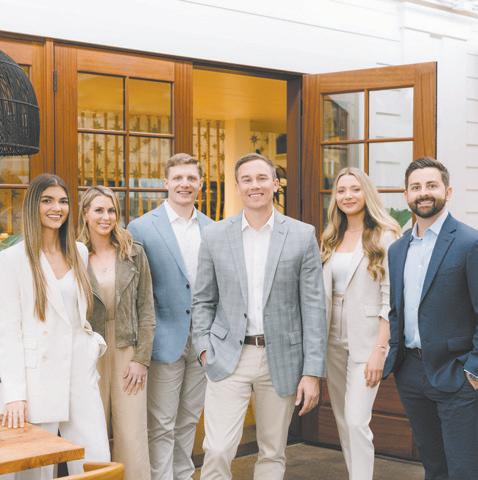



Milton man revived in Roswell Area Park
 By DELANEY TARR delaney@appenmedia.com
By DELANEY TARR delaney@appenmedia.com
ROSWELL, Ga. —The last thing Nick Bogle saw before his heart stopped beating at Roswell Area Park was two people inspecting the park’s automated external defibrillator, or AED.
The 63-year-old Milton resident was walking past the park bathrooms toward his soccer practice Feb. 4 when he experienced sudden cardiac arrest. Within moments, a fellow soccer player and retired fire chief started CPR on him.
When CPR proved ineffective, the pair inspecting the AED acted. Jeff Freemyer, a board member of elder-focused soccer club FC Georgia United, called 911. Alina Waring, an emergency physician administered the AED.
After only a few minutes and a single shock from the defibrillator, Bogle was revived and taken to the hospital by emergency medical services. Bogle spent four days in the hospital where he had an internal cardio defibrillator placed in his heart. If his heart stops again the device will restart it.
Weeks later Bogle is back on his feet, preparing to return to his athletic lifestyle.
“My recovery really is going to be
complete because they got to me so quickly,” Bogle said.
The soccer player called the lifesaving measures a “miracle.” Bogle said he was lucky to be right by the AED, and he was lucky the device they inspected was charged and ready for use.
Bogle ran through everything that could have gone differently, that could have kept the three individuals from saving his life. The American Heart Association says 436,000 Americans die from cardiac arrest every year.
Somebody could have been in the bathroom where the AED is stored, Bogle said. The device could have been dead. He could have been alone.
Thankful for his recovery, Bogle said he wants to raise awareness about the lifesaving measures around Roswell parks. He credits the city for keeping AEDs at all the fields.
Recreation and Parks Department Director Jeffrey Leatherman said the city has 31 AEDs spread across the parks, recreation centers and art centers.

“We want people to be as safe as they can be in our parks and facilities,” Leatherman said.
The devices are stored in women’s restrooms, usually around active areas like the sports fields. While the devices are readily available, Leatherman knows they can blend into the background.
“When you notice them all the time, you forget they’re even there,” Leatherman said.
Leatherman encourages people to “be conscious” and take mental notes of where the devices are in the parks. He said staff are also available to help in emergency situations.
“It’s just a way we can all help take care of the community and take care of our neighbors,” Leatherman said.
Bogle said the other part of community safety falls on “individual responsibilities,” and everyone should take the time to learn CPR. If performed immediately, the American Heart Association said CPR can double or triple survival chances for cardiac arrest.
He also said people should learn how to use the AED devices, because they can be “intuitive, but intimidating.”

The devices all have directions printed on the outside, as well as audible commands and photo instructions. The defibrillator only activates when all the systems are hooked up correctly.
Leatherman said the device manufacturers also have how-to videos online.
Bogle and his soccer club have helped fund some of the devices because, as an older group, they must prepare for heart attacks.
Bogle emphasized that cardiac arrest
After experiencing sudden cardiac arrest at Roswell Area Park on Feb. 4, Nick Bogle was revived with the help of people around him and an automated external defibrillator, or AED.
could happen to anyone, no matter their age or fitness level. He named Damar Hamlin, a 24-year-old professional football player who experienced sudden cardiac arrest on the field as an example.
“I didn’t think this could ever happen to myself, and I was a little bit arrogant about it,” Bogle said. “It shows it can happen to anyone really.”
As he prepares to resume sports again, Bogle said he’s grateful for the community who came together, from his family and teammates to the doctors and nurses at the hospital.
“This story has nothing to do with me, and everything to do with everybody else around,” Bogle said.
Pickleball club franchise to launch in Roswell
 By DELANEY TARR delaney@appenmedia.com
By DELANEY TARR delaney@appenmedia.com
ROSWELL, Ga. — Ace Pickleball Club is set to open Roswell’s first indoor pickleball club on Market Boulevard this spring. The club will feature 14 professional grade courts members can access anytime.
The membership-driven, indoor pickleball court will be the first location for Ace Pickleball Club. It will function as the headquarters and “beta-testing site” as the franchise expands nationally.

Pickleball is a sport that has skyrocketed in popularity since the onset of COVID-19 in 2020. The sport is similar to tennis but employes paddles and whiffleballs on a smaller court.
Ace Pickleball Club co-founder and CEO Jay Diederich said the sport became popular with older age groups, then grew to include the younger set.
“There are millions of people pouring into the sport and it’s no longer that retiree age group,”
Diederich said. “The average age was 64 and a-half, and now we’re headed to the mid-20s.”
Diederich said the sport is starting to expand into high school programs as well. People as young as 12 and as old as 80 can play, and the gender split is even.
The club co-founder started playing the sport with his wife while living in Florida at the start of the COVID-19 shutdowns. It was one of the few ways the couple could get out of the house.
“We were hooked immediately,” Diederich said.
Within weeks, the pair had already met upwards of 40 new people who also played pickleball. For Diederich and others, the sport replaced the gym.
But the Florida weather wasn’t ideal because of the “brutal” heat, and many tournaments and matches got cancelled or rescheduled last minute.
When Diederich’s wife suggested the sport move indoors, a lightbulb went off.
Diederich has worked in
development for Sky Zone, an indoor trampoline park franchise for the past decade, so he was familiar with the concept of indoor athletic spaces. He met with Joe Sexton and Vincent Barrios, both Sky Zone employees, to “take a hard look at moving pickleball indoors.”

The co-founders knew they wanted something different than the typical entertainment establishments, like Pickle and Social or Chicken N Pickle which are primarily restaurants that use pickleball to drive traffic.
Pickle and Social had originally committed to developing a location in East Roswell in 2020 but backed out of the deal in 2022 after they deemed the property too cost-prohibitive. The pickleball facility and restaurant opted to develop a location in Alpharetta instead.
Diederich said those places are creating family-friendly environments, but he wants to prioritize an all-ages pickleball club that’s “welcoming to all players.” That welcome extends to
See PICKLEBALL, Page 6












Coaches attend classes in basic emergency care
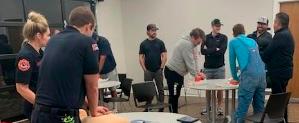
MILTON, Ga. — Nearly 50 coaches from Milton-affiliated athletic programs received special training from members of Milton Fire CARES, or Community Advocates for Referral and Education Services, about how to act in an emergency.

Among other things they learned:
• The basics of CPR, which can be used to save a life when breathing or heartbeat stops.
• How to use an AED, or automatic external defibrillator, that can revive someone from cardiac arrest. There are AEDs at the city’s two main athletic facilities, Bell Memorial Park and Legacy Park.

• What to do if a person starts
Pickleball:
costs, too.
“For the price of one trip to Pickle and Social, that’s monthly access (to Ace Pickleball Club),” Diederich said.
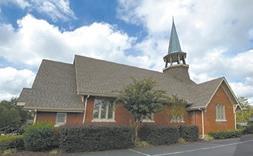

The Roswell location will be open play-oriented, and members will have priority access. For a monthly fee, members can come in at any time to hop into a game. There will also be member-focused events and tournaments.
“Everything revolves around the game itself, and activating more people to the sport, whether you’re playing for fun or socializing or training to get on tour,” Diederich said.
The co-founder picked Roswell after he moved his search out of Florida. He said the establishment
choking on something.
The participants attended two sessions Feb. 22 and Feb. 25 in the Community Center at Milton City Park and Preserve. Firefighters Derek Hofmann, Mary Glasgow and Justin Steele were the instructors. The training aligns with the CARES mission to bring valuable health care services, education and programs to people throughout the community. To learn more about the program visit miltonga. gov/FireCARES.
Residents interested in this kind of training for their community group or homeowners associations can contact CARES Coordinator Derek Hofmann by emailing fire.CARES@miltonga.gov.

could work in most markets, but Roswell “blew him away.” The location is close to Atlanta’s HartsfieldJackson Airport, a perk for future business travel, and Diederich was drawn to the area’s growing film industry.
As the Ace Pickleball Club franchise headquarters, the location will be the site of future advancements, like livestreaming, instant replay and instant highlight reels.

“The Roswell players are going to be on the cutting edge,” Diederich said.
While the club will likely not open until late May, Diederich said interested players should join the waitlist now. The club has a cap on memberships to provide adequate playing time for everyone.
“We have the leg up to figure out what this can look like, what the model can look like,” Diederich said.
Workshop:
Site plans
Serving as more of an open house, the last of three workshops March 2 allowed around 30 stakeholders to lay eyes on two draft versions of the district’s master plan, drawn from their feedback. Stakeholders include the area’s 11 property owners and owners of adjacent properties.
Ryan Snodgrass from TSW, the design firm responsible for drawing the overlay, displayed plan details that spoke to a “village” feel — a desired element raised in previous workshops. Plans call for lower buildings with a smaller footprint.
The two maps are nearly identical, however one version for the Preferred Master Plan places an office space and adjacent parking lot behind the Milton Library, increasing the density.
Both are broken into four areas. The original Preferred Master Plan holds true to a density of 5 units per acre in each area and includes commercial/mixeduse, residential and programmed open spaces.
Visitors had the opportunity to speak with Snodgrass, TSW Founding Principal Tom Walsh, Milton city staff and steering committee members directing the project. The steering committee consists of members of the Design Review Board, the Planning Commission, the Board of Zoning Appeals and the Milton Historical Society.
Guests were also encouraged to mark up the site plans to the back of Council Chamber, using markers and post-itnotes.
Snodgrass said the team will give the final presentation to the City Council April 20, then look into potential code changes to adopt the plan.
Project beginnings
Charlie Roberts, chairman of the Milton Design Review Board (DRB), said the idea for a Mayfield overlay district stems from an incident around three or four years ago when a developer sought a demo permit to tear down one of the area’s historic buildings.
The DRB, the city’s authority for approving design aesthetics and building developments, rejected the permit. But Roberts, a developer by profession, said the situation got him thinking about what was going to happen to the Mayfield area. He said for nearly 100 years, Mayfield had been a center of commerce for Milton’s farming community.
The area includes several buildings that are historic and architecturally significant to the north Atlanta area, he said.
In a report, the Milton Historical Society lists 10 sites of historical significance in the area. One includes 800 Mayfield
Road, now known as Milton’s Cuisine. In the letter describing renovation to the property, which would become Mr. John B’s, the owners describe the Crabapple community as a “melting pot of the better sort.”
“The old pioneer spirit lives on with just enough of the new for added zest,” wrote the owners, the Pittmans. “A place where you are still accepted for what you are rather than who you are. It is probably one of the few areas this close to bustling downtown Atlanta where you can still dress as you please, reflect on places of your childhood and return to everyday life feeling refreshed.”
Roberts took a cue from Canton Street in Roswell and other areas around the country that have become successful but have preserved a way of life. His thoughts prompted him to ask the City Council consider a moratorium for the area to stall development, which was approved last summer and extended in December to June 20.
“I didn’t want to see it developed over a number of years in a hodgepodge way,” Roberts said.
Preserving history
Seven of the buildings are at a potential risk, said Kathy Beck, archivist for the Milton Historical Society. They were front and center to her presentation given in February. Beck said they represent the city’s agricultural life.
About half of the buildings were historic homes. Beck called three of them the “Mayfield trio,” located on Mayfield Road. The trio consists of the Oliver house built around 1905, the Sutton house built in 1920 and the Byrd house, built by JJ Rucker in 1908.
JJ Rucker is the descendent of Simeon Rucker, one of the area’s earliest White settlers who founded the Rucker Cotton Seed Company in 1930.
The other two buildings in Beck’s presentation were commercial, opposite the Mayfield trio, and are related to the Ruckers — the cotton gin’s records building built in 1900 and the Rucker Warehouse built in 1902.
Beck described two other historical structures at potential risk, the John B. Broadwell houses on 765 Mid Broadwell Road, built in 1935.
The district encapsulates more than just local history, Beck said, in that it parallels Georgia history.
“When you look at Crabapple and those buildings … they’re all right there together,” Beck said. “Just visually, when you look at it, that’s what you see — old Georgia, but it happens to be right here in Milton.”
Stakeholders state preferences
The maps presented March 2 were created from comments provided in the previous workshops.
The first meeting, held in January, sought feedback based on three map
designs developed by TSW. The maps were theoretical in nature and gave the public an idea of what would be allowed in the district under the current zoning code. Only one map preserved the area’s historic buildings, making it clear to stakeholders that the code allows for their demolition.
Stakeholders said the biggest threat posed to the District at Mayfield is loss of character and history and defined the site as it is currently with historic cottages, historical commercial buildings and new commercial/office space. The audience also said density is a threat to the area, which could be exacerbated by townhomes.
Most advocated for programmed open space and desired a pedestrian connection from the library to Mid Broadwell Road.
At the second public workshop meeting in February, Jefferson McConkey, a landowner and developer in the area, read into the record his vision for the district.
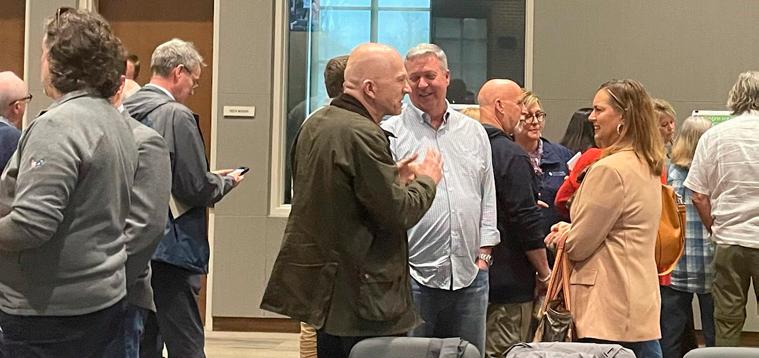
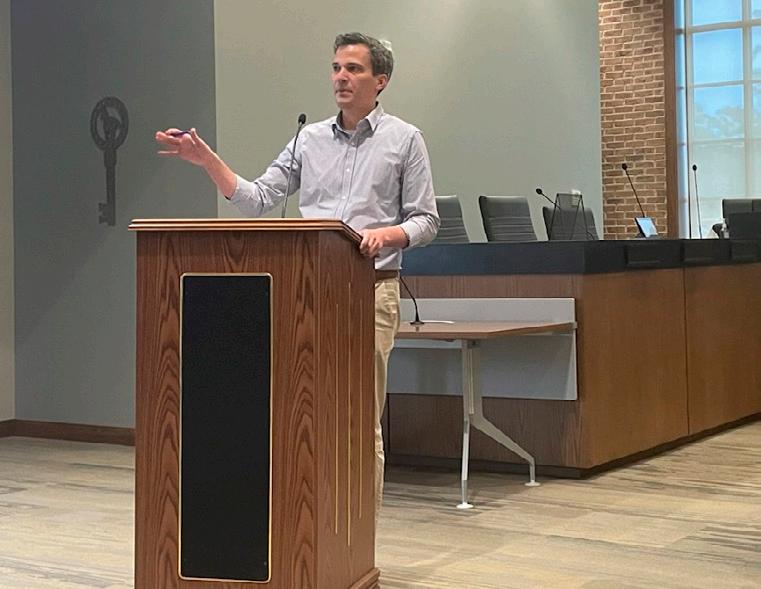
“The District at Mayfield should become Milton’s idyllic interpretation or version of every dreamer’s best backyard,” McConkey said.
To learn more about the project and view all recordings of the public workshops, visit the city’s dedicated webpage.
8 | Milton Herald | March 9, 2023

Vino Venue serves as one-stop wine shop
By DELANEY TARR delaney@appenmedia.comDUNWOODY, Ga. — For the past decade, Vino Venue has been a onestop shop for all things wine related in Metro Atlanta. As a retail space, restaurant, wine school, private event space and travel hub, the store aims to educate everyone interested in wine.


Michael and Lelia Bryan went on their first trip as a couple to Napa Valley, California in 2001. Lelia was a wine lover, but Michael Bryan was new to the spirit.
“He absolutely fell in love with it,” Lelia said.
Michael returned and decided to start teaching wine classes. In the early 2000s, Lelia moved from Brookhaven to join Michael in Dunwoody and the pair opened the Atlanta Wine School on Holcomb Bridge Road. The school was a success, but the couple wanted to expand.
“We had so many people who would taste wine during their classes and want to buy them, want to learn more about them, want to be able to sample different wines,” Lelia said. “It really just made sense to have a place like Vino Venue.”
In October 2012, they opened the doors to Vino Venue, a so-called “wine emporium” with a retail store, cooking classes, tastings and a tapas-style restaurant. One month later, Michael Bryan was diagnosed with sarcoma, a rare form of cancer. He passed away five years later, in 2017.
Those five years were challenging for Lelia and the couple’s daughter,
Willa.
“When he did pass, it was my goal to really just keep the vision he had alive,” Lelia said.
Vino Venue now sees 3,000 visitors annually for wine and cooking classes
and conducts about 300 private wine events a year. The emporium also hosts a variety of guided wine trips throughout the year to destinations like Portugal and Piedmont, Italy. The establishment has grown since
it opened 10 years ago, but Lelia said she tries to maintain Vino Venue’s initial goal.
“We want to educate people who wanted to know more about the












We want to educate people who wanted to know more about the passion around wine.
LELIA BRYAN, owner, Vino VenueDELANEY TARR / APPEN MEDIA Vino Venue, a wine bar, restaurant, event space and wine school has more than 100 wine bottles for sale at its Dunwoody location. The staff tastes about 100 wines a week to maintain a varied offering. See WINE, Page 9
Wine: NEW BUSINESS SPOTLIGHTS
Continued from Page 8
passion around wine,” Lelia said. “Not in a snotty or uptight way, but in a fun way, where people can really experience and try new things and broaden their horizons.”
Vino Venue offers more than 100 types of wine for sale. About 10 percent of the selection costs more than $75. Lelia said the goal is to make wine approachable for everyone.
“We pride ourselves in finding unique wines that aren’t going to break the bank, are very enjoyable and are between $10 and $20,” Lelia said.
The selections aren’t what a customer may find at a typical grocery store, because the Vino Venue staff takes time to find “unique gems.” Lelia said her team tastes about 100 wines a week to find the best bottles.
“It’s a labor of love, it’s actually a lot of work,” she said.
Across the years, Vino Venue has opened its wine classes to people with all levels of experience and interest. Atlanta Wine School, now housed in Vino Venue, offers Wine and Spirit Education Trust certifications.
The establishment also offers casual classes during the week that span across wine regions, like “taste
of Italy” or “taste of Greece.” Wine professionals teach attendees about the flavors of the region, as well as the best pairings for different foods.
Every few months, Vino Venue puts on a “discover” festival, like the upcoming “Discover France Festival” on March 26. Attendees can buy a ticket and sample around 80 wines and foods centered around France.
Events like the discover series draw hundreds of customers, but Lelia said the business is “relationship-based.” Her goal is to bring customers in on any level of their wine education and keep the relationship growing.
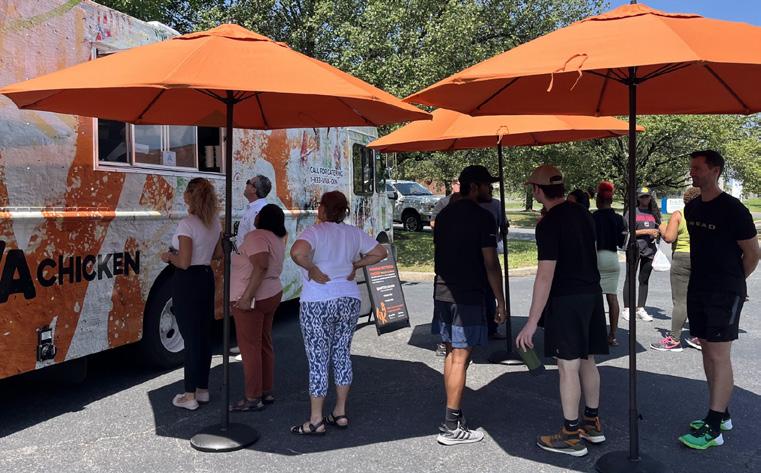

“Michael was passionate about making people feel comfortable in whatever wine knowledge they have, but also in their preferences,” Lelia said.
As the managing partner of Vino Venue, Lelia is an avid wine drinker. She said picking a favorite wine is like “picking a favorite child.” She takes particular pride, though, in a wine that honors her husband.
Lelia had a close friend and winemaker in Italy scatter Michael’s ashes in a vineyard, and the winemaker dedicated the vineyard to Michael. The white wine created from the vineyards is sold at Vino Venue, and all profits go to sarcoma research.
“It’s a beautiful white wine, it’s very unique,” Lelia said.
Name: VIVA Chicken
Owner: Gerald Pulsinelli, CEO

Description: VIVA Chicken, a fast-casual charcoal-fire rotisserie joint that serves distinctively fresh and flavorful chicken and sauces made from authentic Peruvian recipes, will open its second Georgia restaurant on March 1, located at 11760 Haynes Bridge Road in Alpharetta.
Opened: March 1, 2023
Address: 11760 Haynes Bridge Road, Alpharetta, Ga, 30009

Phone: (404) 474-8512
Web Address: http://vivachicken.com
 Paras
Leader Tara Tucker
Paras
Leader Tara Tucker
Summer Camps

A summer camp to stretch their imagination and delight

Brought to you by – Flour Power Kids Cooking Studios

Flour Power Kids Cooking Studios, located on Main Street in downtown Alpharetta, is ready to welcome your children to summer camp! Our popular cooking camps are offered weekly, May 30th through August 5th, and are open to kids ages 5-12. We’re offering both full and half day camps this year!




Each week will feature a different theme, from the Chocolate Factory to Christmas in July to Movie Munchies! Your lil’ chef will be making their own snacks and lunch and will round out their day with arts and crafts, kitchen science experiments, games, and
lots of FUN! All ingredients and supplies are included. For more information and to register, visit our website at www. flourpowerstudios.com/alpharetta. Questions? Give us a call at 470.760.6460. We look forward to seeing you this summer!
Kimberly Rosario, Owner/ Operator 470.760.6460
Flour Power Kids Cooking Studios Alpharetta flourpowerstudios.com/alpharetta
Join Me On: Facebook | LinkedIn
Don’t miss out on our upcoming classes and events! Check them out and register here.
A wakeup call to learn your risk for diabetes

Brought to You by - Home Helpers of Alpharetta and North Atlanta Suburbs



March 28th is an important day on the calendar. The fourth Tuesday in March is the American Diabetes Association Alert Day, a “wakeup call” to take time, learn your risk factors and determine if you or your loved ones are at risk for Type 2 diabetes.

Over 34 million Americans have diabetes, which happens when blood glucose levels, or blood sugar, is too high. Even more surprising is that 1 in 7 – or over 7 million adults - don’t know they have it. As we age, the risk of developing diabetes increases. Type 1 diabetes most often occurs in children and young adults. Type 2 diabetes is the most common kind for middle aged and older adults. Over time it can lead to heart disease, stroke, kidney problems, eyesight and nerve damage. Millions of additional Americans also have prediabetes, which means their glucose levels are higher than normal, but not high enough to reach diabetic levels.
Learning your risk factors can start with taking the simple Diabetes Risk test on the American Diabetes Association website. Chances of getting it are higher if you are overweight, inactive or have a family history. Talk to your doctor to find if simple blood tests that can help diagnose diabetes, like an A1C test that can be given at any time of day and shows your average glucose level for the past three months, are a good idea for you. Become familiar with the symptoms of Type 2 diabetes, that include
increased hunger or thirst, feeling tired, losing weight without trying, going to the bathroom more frequently, blurred vision and skin infections or slow healing bruising. Your older loved one may also have signs of depression or cognitive issues.
The good news is that many Type 2 diabetes cases are preventable with healthy lifestyle changes. Develop a plan to review with your health care provider that addresses the following steps. Avoid a sedentary lifestyle, with a plan for walking or other forms of daily exercise. Manage your weight with healthy food choices, like eliminating sugar and refined carbohydrates. Stop smoking. Stay hydrated, water is a wonderful choice. Make sure you regularly take any prescribed medications for blood pressure or cholesterol, and track your numbers.
At Home Helpers we know a skilled and well matched Caregiver can help make each day the best it can be for your older loved one, whether it’s making sure a safe walk is a part of their day, following a healthy diet with nutritious meals, monitoring vital signs or creating bonds to battle social isolation. Our heart centered Caregivers can assist with all personal care, help around the house, or provide specialized care for Alzheimer’s, Dementia, Parkinson’s, etc.
We’re here to help – from six hours a day, several days a week to 24/7 and live-in care. For a free consultation contact Home Helpers of Alpharetta and North Atlanta Suburbs at (770) 681-0323.





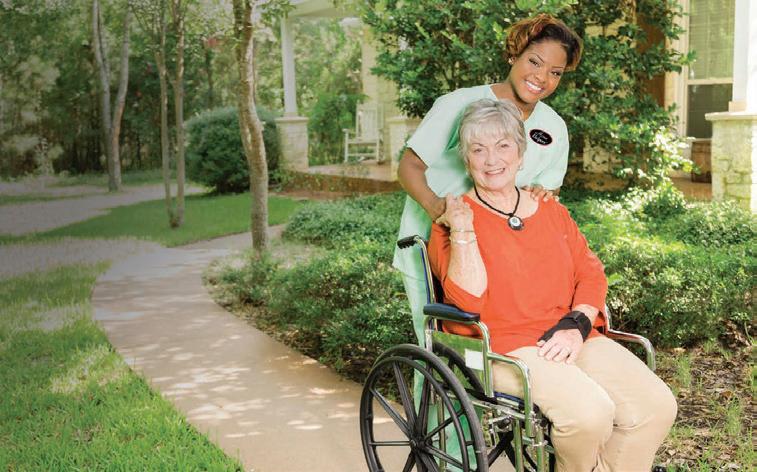
Medical ethics and dermatology

Ethical questions arise in all fields of medicine, and dermatology is no different. One of the more remarkable cases that I encountered during training was that of a woman who became pregnant while taking a medication known to cause birth defects. Despite explicit and severe warnings, she insisted that she be allowed to keep taking the medicine throughout her pregnancy. When her dermatologist refused to prescribe the medicine, the patient convinced the hospital’s ethics board to recommend that her obstetrician continue prescribing the medication during pregnancy. The woman received her prescriptions at the board’s recommendation, and the baby was tragically but not unpredictably born with birth defects.
Although I wholeheartedly disagree with the ethics board’s recommendation, I can see how ethical principles are sometimes difficult to apply in practice. The four guiding principles of medical ethics are often taught to be “autonomy, beneficence, non-maleficence, and justice.” Loosely translated, these principles mean: respect someone’s right to choose; do good; do no harm, and act in a fair or equitable way.
The above example is extreme. The ethics board made a mistake and prioritized “autonomy” above all other considerations (including “do no harm”). But many less dramatic ethical considerations occur almost every day in practice. When treating patients, I find that the common sense strategies of putting the patient first and asking what I would want for a family member go a long way towards making sound ethical decisions.
In Mohs surgery, a tissue removal technique for curing skin cancers, shades of grey are often encountered. Cancer is not always black and white. Sometimes, invasive cancer has been eliminated, but the edges have “in situ” cancer – cancer
confined to the top layers of the skin, or the edges exhibit “actinic keratoses,” best understood as “pre-cancers.” Severely sun-damaged individuals sometimes have cheeks or scalps that are covered with precancers and “in situ” cancers. Continuing to cut in such cases is sometimes not in the patient’s best interest. Instead, once the invasive cancer is removed, I frequently discuss switching strategies with my patients. We often treat the area around an invasive cancer with an anti-cancer cream post-operatively instead of dogmatically continuing to cut and missing the forest for the trees.
Personalized medicine is often medicine at its best. One recent patient presented to me for a second opinion regarding a melanoma on his eyelid. The first surgeon the patient saw recommended complete removal of the lower eyelid and a 3 month reconstruction process during which the patient would not be able to see from that eye. The patient and I discussed that the large margin the first surgeon recommended is the standard of care. However, the patient stated that at his age he did not want to undergo an extensive surgery. He understood the risks and chose a smaller margin. He understands that the “middle ground” option that he wanted is not in line with the official guidelines for treating cancers like his, but the smaller surgery that he chose is the option that is right for him. The standard of care is a guideline. The patient comes first.
As interesting as philosophical principles like autonomy and nonmaleficence are, I have found that the most useful principles are variations of the Golden Rule. Treat patients like you would want your family or loved ones treated. And put the patient first.

If you or a loved one has a skin cancer or other skin care needs, please consider Premier Dermatology and Mohs Surgery of Atlanta. It is our privilege to take care of you.
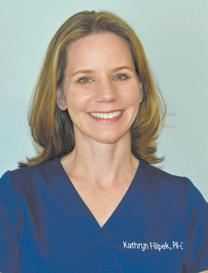

A quick guide to Semaglutide: The once-weekly weight loss injection
Brought to you by - Hydralive Therapy Milton
Lose weight with just one weekly shot? Qualifying individuals can take advantage of the latest non-surgical medical weight loss option, Semaglutide injections, right here at Hydralive Therapy Milton.

Who qualifies for the program?
Semaglutide can be prescribed for adults who have obesity, with a body mass index (BMI) of greater than 30; or overweight, with a BMI greater than 27 accompanied by at least one weightrelated medical problem such as high blood pressure, type 2 diabetes or high cholesterol.
Semaglutide is not recommended for those with a personal or family history of certain endocrine or thyroid tumors, including medullary thyroid cancer.
How is the treatment administered?
Semaglutide is self-administered as a subcutaneous injection (shot) once weekly. This medication is generally welltolerated, and it can be taken long-term.
How does it work?
Semaglutide mimics a hormone produced in the small intestine that
increases the sensitivity to the insulin your body produces, decreasing the amount of hunger hormone your body makes. It also acts on the “rewardcenters” in your brain to suppress appetite. Reduced hunger in combination with lifestyle modifications including healthier food choices, healthier meal intervals, and increased exercise have been proven to result in weight loss–even in individuals who have previously struggled to lose weight.
How much weight can I expect to lose on Semaglutide?
Studies have shown the average person lost around 10-20% of their bodyweight with the use of Semaglutide. For example, a patient weighing 250 lbs may expect to lose around 25-50 lbs.
Getting Started
At Hydralive Therapy Milton, we take a holistic approach to wellness. We understand Semaglutide can be extremely beneficial across a wide spectrum of people with obesity, but we also believe it is important to use this medication in conjunction with lifestyle changes.
When you are ready to get started, a medical consult is performed with our
physician assistant or nurse practitioner. They will review your present health situation and determine your eligibility for Semaglutide. From there, they will prescribe Semaglutide and coach you
along your weight loss journey. Semaglutide could be your path to long-term weight management. Call us at (470) 359-4815 to schedule a consultation today!

The intersection of faith communities and mental health

 Brought
Brought
to you
by - Cathy Murphy, Director of Community Outreach, Summit Counseling CenterMany people with mental health conditions, including suicide risk, often turn first to their faith community for help. On Thursday, March 30th the North Fulton Mental Health Collaborate will lead a panel discussion surrounding mental health and the important role of our faith communities.


Spirituality and Mental Health
Many turn to their faith community for support in dealing with mental health problems. Supportive relationships, such as family, longterm friendships and meaningful connections through faith can be important to building resilience and well-being. Faith communities can also play a key role in educating their members about mental health problems.
Culture and Mental Health
Culture can provide a lens for how people think about mental health and how people and mental health professionals interact with one another. Racial and ethnic minorities bear a greater burden from unmet mental health needs due to the stigma surrounding mental health in their culture. There is also a racial/ethnic inequity within the mental health workforce. Just this month, Rep. Michelle Au, D-Johns Creek, was able to get a last-minute amendment to H.B. 520 that would require a workforce study commission to examine cultural competence and language to better understand how the state can meet the mental health needs of Georgia’s diverse population. How can faith communities address these issues and minister to those in need?
Educate your communities and congregations. Promote awareness by educating the members of your communities and congregations about mental health issues through educational forums and other opportunities.
• Invite local mental health experts—including those who have experienced mental illness—to speak with your congregation or at community gatherings.
• Share facts and common myths about mental health.
• Organize additional meetings, dinners, or other gatherings for members of your congregation or community to have conversations about mental health.
Identify opportunities to support people with mental illnesses. Religious organizations can play an important role in supporting individuals living with mental illnesses and encouraging them to seek help.
• Consider offering your organization’s meeting spaces for community conversations and support groups focused on addressing mental health issues.
• Provide space for peer-led groups that give people the chance to tell their stories in their own time and way.
• Support community programs (for example: peer mentoring programs or opportunities for volunteering) that encourage social participation and inclusion for all people.
Connect individuals and families to help. Strengthen the connections within your community to mental health services and support and
enhance linkages between mental health, substance abuse, disability, and other social services.
• Learn the basic signs of mental illnesses and other facts about mental health to encourage those in need to seek help.
• Remind others that people can and do recover from mental health challenges and that help is available and effective.
• Train key community members (such as adults who work with the children, youth, older adults, veterans, and LGBTQIA) to identify the signs of depression and suicide and refer people to resources.
• Develop relationships with local mental health service providers and other family and youth organizations to help direct individuals and families in need to available services and support in the community. other social services.
• Promote acceptance of those with mental health issues. The voices of leaders and members of faith-based organizations can greatly influence
attitudes about mental health conditions and those who experience them.
• Talk about your own mental health openly.
• Be an example of taking good care of your mental health by making mental wellness a priority in your personal life.
• Be inclusive. Mental health affects all of us.
• Foster opportunities to build connections with individuals and families dealing with mental health challenges through trust and acceptance.
• Foster safe and supportive environments for people to openly talk about mental health, stress, trauma, and related issues.
Join us on Thursday, March 30th from 10:00-11:30am at Alpharetta FUMC, 69 North Main St., Alpharetta to be a part of this important discuss. Learn more about the event and our panelist on our website at summitcounseling.org

Information from mentalhealth.gov/ talk


It’s time for spring cleaning
reshaped painlessly. You can make your smile healthy and vibrant again and create the smile of your dreams.

I don’t know about you, but I can feel it. I can see everything starting to bloom. Everything is getting greener. These last two weeks the weather has warmed up. I can finally start to spend more time outside. Spring is coming! It’s time to get ready. It’s time to get in shape! I can’t wait to walk and run and spend more time outside. It’s time for Spring Cleaning! Do you need a spring dental cleaning or maybe a Smile Tune-up?
This year, let’s eat healthy, exercise, and address our health proactively and preventively. This includes a visit to the dentist to address those problems that you know are getting worse and to prevent future problems.
• Restoring Your Smile –Repairing your teeth allows you to keep your teeth for a lifetime and look and feel your best.
• Cosmetic Dentistry – It’s more than just Whiter Teeth. Uneven and chipped teeth can be
• Dental Implants – Replacing missing teeth allows you to eat your favorite healthy foods again, smile without fear, and provides support to your face to avoid looking older.
• Invisalign – The metal-free way to straighten your teeth, improve our bite, and have an attractive smile that everyone notices.
• Preventive Tooth Cleaning – Routine cleanings prevent problems and keep your teeth healthy, white, and attractive.
• Don’t Forget that these things can be accomplished comfortably while you rest… with Sedation Dentistry!
A healthy mouth is part of a healthy body. Our wish for you is that you look and feel your best in 2023!
“Preventive Dentistry can add 10 years to human life.” -Dr. Charles Mayo of the Mayo Clinic

Dr. Bradley Hepler, Dr. Jeffrey Priluck and the experienced team at the Atlanta Center for Dental Health provide the most modern advances in cosmetic dentistry. Experience immediate results with procedures to greatly enhance your smile and your health. If you would

like a complimentary consultation to discover your options, please call us at 770-992-2236. Dr. Hepler and Dr. Priluck are highly trained and certified to provide you with the latest and best techniques to allow you to achieve your cosmetic and restorative goals.

Colorectal cancer: moving beyond awareness
Brought to you by - Dr. Jay Singh, medical director of surgical services at Wellstar Health System
Since 2000, when then-President Bill Clinton designated March as Colorectal Cancer Awareness Month, the mission to decrease the worldwide incidence of the third most common cause of cancer and the second most common cause of cancer-related deaths has largely been successful if we simply measure “awareness.”
Unfortunately, as we have seen decreasing incidences in colorectal cancer related to screening, particularly colonoscopies, in older individuals, we


have seen a disproportionate increase of cancers at younger ages. As a result, the current recommendation for screening has gone down from 50 years of age now to 45, as of 2021.
Awareness begins with education of not only the signs and symptoms of colorectal cancer but the fact that real prevention occurs before any symptoms can be seen. Awareness begins with understanding one’s own risks, including family history and personal behaviors that would immediately put someone at higher risk for developing colorectal cancer. We know that people with a first-degree relative who has had colorectal cancer are at twice the average risk of developing colorectal cancer and should generally get screened earlier. We know that people who smoke, consume alcohol or are obese are more likely to be diagnosed with colorectal cancer. Adopting healthy behaviors, including quitting the use of tobacco products, reducing
alcohol consumption and eating meals that include fruits, vegetables and whole grains, can also reduce the risk.
Recognizing the impact that this disease has on individuals, families and society, Wellstar has invested in educational programs designed to get the word out, preventive programs that recognize that any test for colorectal cancer is better than no test and treatment programs that involve the comprehensive, multispecialty care of the disease process from diagnosis to treatment.
Wellstar has had an intensive focus on increasing access to screening by the creation and growth of a gastrointestinal service line spanning all our campuses and outpatient centers. This has been in coordination with growth of colorectal surgical services at Wellstar North Fulton Medical Center and the expansion of our minimally invasive and robotics programs
throughout the system.
We are proud to have Atlanta’s first program recognized by the National Accreditation Program for Rectal Cancer (NAPRC), a quality program of the American College of Surgeons, at Wellstar Kennestone Regional Medical Center and hope to soon have that same accreditation at Wellstar North Fulton and Cobb medical centers. This accreditation demonstrates Wellstar’s commitment to providing personalized, high-quality cancer care close to home for patients in Georgia. Imagine, after being diagnosed with a potentially devastating illness, you could meet your whole treatment team and have a plan developed in one visit. This is all part of our mission at Wellstar to enhance the health and well-being of every person we serve.
Learn more about colorectal cancer screening at wellstar.org/cleancolons.
COMPREHENSIVE CANCER CARE
From diagnosis to treatment and survivorship, Wellstar is ensuring the community in this area has access to expert, compassionate cancer care.
The new Wellstar North Fulton Cancer Center brings more than 12,000 additional square feet on the medical center campus dedicated exclusively to groundbreaking cancer treatments right here in the North Fulton area. Services include:
• CyberKnife radiation technology
• Physician expertise in many specialties
• Surgery, medical and radiation oncology
Find care at every step of your cancer journey here in North Fulton.
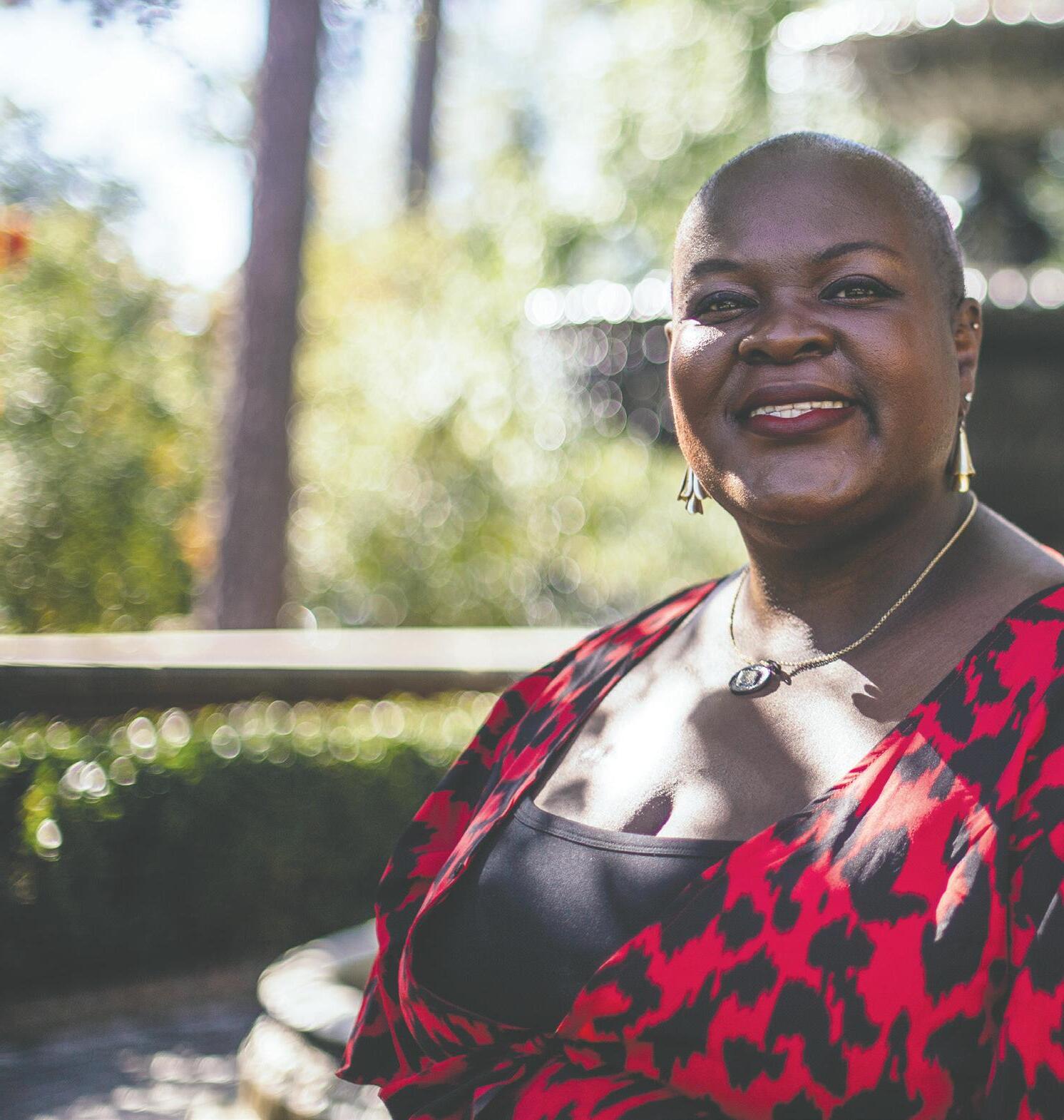
wellstar.org/northfultoncancercare
Wellstar North Fulton Cancer Center
4500 Hospital BLVD | ROSWELL (770) 410-4530
Thank You for Voting US Best
At Roswell Dental Care, we take pride in our ability to educate our patients about their oral health. One question we frequently hear from our patients, “Why do I get so many cavities? I brush my teeth every day!” We understand the frustration that comes from putting the work in to maintain your teeth and still ending up with cavities, we are here to help break those reasons down for you.
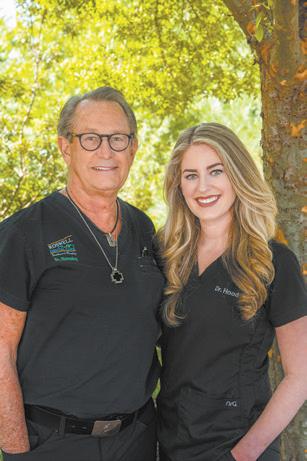


1. How deep your grooves are:
How your teeth are shaped, including the grooves of your teeth, are inherited. These grooves are too small for your toothbrush bristles to get in and clean properly. Some teeth have deeper grooves, which increases the risk of biting surface cavities. We can prevent these types by placing sealants (plastic) over the grooves of the teeth.
2. Your oral bacteria: Did you know, you inherit the genetic layout of your oral bacteria from your mom? The types of oral bacteria can impact your oral health, including your likelihood of cavities and developing periodontal disease. Staying on a cleaning schedule with your dental hygienist will help reduce the number of bacteria you have in your mouth.
3. Your frequency of sugar intake: Your habits also play a significant role in your oral health. Your frequency of sugar intake has a direct tie into the frequency of the occurrence of cavities. The more times you consume sugar, the more opportunities for cavities to take hold.
4. Your flossing habits: Flossing removes plaque and bacteria from the sides of your teeth, so not flossing on a consistent basis increases your risk of developing cavities between your teeth.

5. Your medications: When you eat or drink anything other than water, the pH of your mouth becomes acidic. Saliva’s job is to neutralize the acidic environment. Some medications cause xerostomia (or dry mouth). If your saliva is reduced or becomes thicker, your teeth have an increased risk of developing decay, especially along the gumline. Products containing xylitol are “mouth wetters,” and xylitol prevents bacteria from adhering to tooth structure, helping to prevent the effects of a dry mouth.
The above reasons are just a few of the many complex factors that go into why cavities develop. As dental professionals, we strive to keep our patients educated in their oral hygiene. Good or bad oral hygiene plays a role in overall health, and we are here to get your oral health in excellent condition so that your overall health can be too. Drs. Hood and Remaley at Roswell Dental Care understand and customize treatment for each person. We assure you will feel confident in the solution you choose before beginning any treatment. For enhanced comfort, we offer FREE nitrous oxide. You can rest assured that your experience will be positive, relaxing, and rewarding on many levels. Give our office a call at 770.998.6736, or visit us at www. roswelldentalcare.com, to begin your journey to happy and pain-free oral healthcare!

Why do I get so many Cavities?!




Community gathers to reject antisemitism
By LUKE GARDNER newsroom@appenmedia.comSANDY SPRINGS, Ga. — On Sunday people of various faiths gathered at Temple Emanu-El to discuss ways to combat antisemitism after anti-Jewish flyers were distributed across the community in early February.
The event, titled “Georgia’s Fight Against Antisemitism,” consisted of small lectures from elected officials and religious leaders followed by a community discussion led by representatives from the Anti-Defamation League.
Senior Rabbi Spike Anderson spoke to a crowd of more than 100 about the importance of uniting against hatred. Also present was Anderson’s friend and fellow faith leader the Rev. David Lower of St. Luke’s Presbyterian Church in Dunwoody. Lower spoke on the importance of interfaith relationships and showing up for the Jewish community.
“We are ready to do what is re -
Damages:
Continued from Page 1
In 2020, the median household income for the City of Milton was $127,487, according to the U.S. Census Bureau.
Lawsuit costs city
Milton Mayor Peyton Jamison said the lawsuit is a civil matter between two parties, and the City of Milton takes no position on it.
The Milton Ethics Board and Milton City Council are named as respondents, acting more as bystanders to provide records. But according to city code, Milton could be on the hook for $5,000 of those fees.
The city has already spent its fair share on the proceedings. Milton City Attorney Ken Jarrard said his firm has billed the city more than $14,100 from the time Palazzo filed the ethics complaint in May, and $6,440 of that was spent in the appeals process alone.
The ethics panel recommended to the City Council that Moore receive a written censure or reprimand outlining the ethics violations he committed and that they be publicly announced at one of its regular meetings and included in the official minutes. In October, Jamison announced Moore had been already “sufficiently sanctioned.” In January, Jameson swore in Moore as the mayor pro tempore.
“That decision was extraordinarily disappointing,” Palazzo said. “Basically, what [the City Council is] saying is
quired of us,” Lower said.
The ADL-led community discussion centered around defining antisemitism, with several attendees detailing various examples. Presenter Eric Ross described the need to discuss actions, not people, as antisemitic because it allows room for apology and growth.
Also discussed was the need for allyship and standing up for oppressed people who face injustice. Presenters referenced the complacency of the general public and the lack of allies the Jewish community had in the beginning stages of the Holocaust.
The importance of solidarity across faiths and among marginalized groups and the need to publicly reject hatred were themes present throughout the event.
“The ADL can’t be everywhere, but I can be where I am,” one attendee said.
The community event is largely in response to antisemitic flyers distributed in Dunwoody and Sandy Springs in early February. Georgia State
… ‘These violations and following the ordinances and ethics in Milton just don’t matter.’”
In a December filing, the Milton ethics panel reinforced its ruling, and requested the court to dismiss Moore’s suit, the relief requested be denied, and all costs cast against Moore.
A hearing is scheduled for May 12 to consider a motion by Palazzo’s attorney Josh Belifante to dismiss the lawsuit, alleging Moore did not file legal action within the state’s required time period. The case will be closed if the motion is granted, unless Moore appeals the order to the Georgia Court of Appeals within 30 days of the Superior Court ruling.
Conflict of interest
Palazzo filed the ethics complaint against Moore for participating in the May 2 vote.
“This wasn’t some pleasant process I wanted to be involved in, but I felt strongly it was the right thing to do,” Palazzo said in an interview at the time.
The agreement concerned the HOA’s purchase and installation of radar feedback signs, with city staff approval, for a total cost of $13,706. It wasn’t until after installation that the HOA learned of a program that allows subdivisions to apply for city funding to pay half the costs for traffic calming measures. The City Council eventually reimbursed the HOA, but has since eliminated the cost-share agreement from the city code.
In his 63-page ethics complaint, Palazzo stated that because Moore lives on White Columns Drive, where three of
House Rep. Esther Panitch, the state’s only Jewish legislator, was among several concerned citizens who awoke to find antisemitic flyers in their driveways.
Panitch said that such events can feel isolating and that seeing so many non-Jewish community members show their outrage was comforting.
Dunwoody Mayor Lynn Deutsch, who is also Jewish, said that while she was upset, she was not surprised because similar flyers had been spread in a nearby area months before.
Free speech vs hate speech
The spreading of antisemitic flyers in February is one of the latest in a disturbing trend of increasing acts of hatred against Jewish people.
Multiple acts of antisemitic acts of gun violence have occurred in the U.S. over the past five years.
Last week, a Los Angeles man was charged with two hate crimes after shooting two Jewish men as they were leaving religious services.
the four signs are located, he stood to be financially affected by the installation and maintenance costs. While Palazzo filed the complaint in an individual capacity, he said he had the full support of the association’s board.
During several City Council meetings, a large number of White Columns residents came forward disagreeing with the HOA action and stated the board did not seek a supermajority consent from the community to purchase and install the signs. At the time, HOAs had the ability to act on behalf of neighborhoods without the petition requirement.
In a letter dated Dec. 1, 2021, Palazzo requested that Moore and city staff help develop a solution to the speeding issue in White Columns and identify locations for the four radar-controlled speed signs.
According to the court document that provides the letter, filed by Moore’s attorney, the request “belies Mr. Palazzo’s later contention that Councilman Moore should have recused himself from the City Council’s discussion on these issues because he had a conflict of interest.”
When asked about the letter, Palazzo said Moore had always deferred everything relating to the HOA to city staff.
“Ultimately, at the [May 2] Council meeting, all of a sudden that did not occur. Everything changed,” Palazzo said. “Basically, city staff, for all intents and purposes, was ignored.”
Resident levies accusations
Councilman Moore declined to comment on his filing. But in his affidavit, he says that the ethics panel
In January 2022, a gunman took a Rabbi and three others hostage at the Congregation Beth Israel in Colleyville, Texas. In October 2018, 11 people were killed in a mass shooting at the Tree of Life Synagogue in Pittsburgh, Pennsylvania. Months later, in April 2019, one person was killed and three injured by a shooter at Chabad of Poway Synagogue in San Diego, California.
An Anti-Defamation League audit recorded approximately 2,700 antisemitic incidents in 2021, the highest number on record since the league began tracking them in 1979.
Temple Emanu-El project volunteer Rich Lapin said he believes that Antisemitism is a community issue, not just a Jewish issue.
“The degree to which antisemitism is present becomes an indicator of the quality of life in a country and or community,” Lapin said.
Many speakers at the event shared
See COMMUNITY, Page 21
ruling caused him financial loss of more than $5,000 in legal fees, damage to his reputation in the community and damage to his professional career.
His involvement with the offshore industry is referenced in his city bio. But he goes further in the affidavit to say he plays a “significant role in pioneering future U.S. government policy related to the granting of offshore wind industry FCC licenses for life/safety communication.”
Moore also says he was able to “solicit and secure meetings as well as receive regular correspondence with high level government officials” prior to the ethics charges. But since his sanction, Moore says he has not been able to secure similar access.
Moore’s professional career was called into question in a prepared statement from the Palazzo camp, alleging that Moore’s activities constitute lobbying and that he is an unregistered federal lobbyist.
Doug Chalmers, Moore’s attorney, would not comment on the allegation. However, a few days later on Feb. 27, he filed a sur-reply providing the full definition of a federal lobbyist, whose lobbying activities must exceed 20 percent of their dedicated time over a three-month period.
In the document, Chalmers references the conversation with Appen Media, in which he learned of Palazzo’s media consultant helping publicize Palazzo’s “baseless attacks” on Moore, “without understanding the law and without knowing – or – indeed apparently even caring about – the facts.”
Community:
Continued from Page 20
the same sentiment. Several described the Jewish people as the “canaries in the coal mine” of a society. ADL Regional Director Eytan Davidson expressed the need to stand in solidarity with all marginalized people, including people of color and the LGBTQ+ community.
Georgia State House Rep. Long Tran called attention to the rhetoric of rightwing politicians as a likely contributing factor to increased hate speech, specifically referencing the “locker room talk” of Donald Trump’s 2016 presidential campaign.
Davidson described the group who distributed the flyers as “loosely organized White supremacists hiding behind the first amendment.”
Besides containing antisemitic content, the flyers suggested that people who might take issue with them are un-American, rhetorically asking “You don’t support free speech?”
Dunwoody police chief Billy Grogan told WSBTV that those who distributed the flyers will not be charged because it is a free speech issue. Davidson assured the community that the ADL and law enforcement are keeping an eye on extremist groups.
Georgia House Bill 30
Rep. Panitch spoke about Georgia House Bill 30 at the event, explaining that it was introduced in 2022 and seeks to provide a legal definition and examples of antisemitism. Similar bills have received bipartisan support and have been adopted by several states. The bill seeks to use the International Holocaust Remembrance Alliance Working Definition of antisemitism.
The American-Arab Anti-Discrimination Committee has taken issue with the definition’s discussion of Israel and has condemned the bill as potentially criminalizing pro-Palestinian speech.
Rep Panitch said the law contains examples of anti-Zionism and that “not all anti-Zionism is antisemitism.”
Panitch said in a previous interview that the bill would not affect incidents like the spreading of antisemitic flyers, because that is considered free speech and is protected under the First Amendment.
To view the International Holocaust Remembrance Alliance (IHRA) Working Definition of antisemitism, go to holocaustremembrance.com.

To learn more about the Anti-Defamation League, visit adl.org.
To learn about how to report hate speech on various platforms, visit adl. org/cyber-safety-action-guide.
To learn about the services and resources offered by Temple Emanu-El, go to templeemanuelatlanta.org.

To learn more and to reserve your space, email mike@appenmedia.com


30328, 30342, 30350

Newspaper Delivery Route Openings with Appen Media Group








We are looking for one person or couple interested in delivering weekly newspapers in South Forsyth, Alpharetta and the Johns Creek areas.
Requirements: Must have a perfect driving record and background check, reliable transportation, honest, hard-working and positive attitude.

For more information or to apply, email heidi@appenmedia.com and include a paragraph or two about who you are and any relevant background/experience. In the subject line of the email please put “Delivery Route Application.”
























If only houses could talk
Sometimes we may pass a building every day for years without giving it a second thought. Such structures may reveal interesting stories if given a second look.
Today, I will describe two buildings side by side on Birmingham Highway in Milton, across the road from Scottsdale Farms, one an attractive white brick house and the other brightly painted green and white with a porch situated under a tall shade tree. The two houses are joined by the history of one family. What stories might these houses tell?
In an earlier column I profiled the life of Billy Albertson (1932–2021) a sharecropper’s son who lived to become a beloved local personality, famous for his vegetable garden on Hardscrabble Road. Billy’s garden was a symbol of friendship, neighborliness, and conversation by those who stopped by to chat, help in the garden, to buy fresh produce or to buy goats that Billy raised.
Circa 1950 Billy’s parents, Egbert Tabor Albertson (1892-1975) and Ola Bell Etris Albertson (1891-1969), purchased a 3-acre farm from Billy’s older brother Judge Albertson and his wife Lula Mae across Birmingham Highway from today’s Scottsdale Farm. Judge and Lula Mae moved to Atlanta for Judge’s new job. Since the family had been sharecroppers and moved from farm to farm every few years, the move to their own farm on Birmingham Highway was a welcome chance to settle down. The green wooden house was already on the property. As a teenager, Billy lived in the house with his parents and sister Betty and brother Bobby. For a while as a teenager, Billy worked at Judge’s mobile sawmill. After an accident at the sawmill Billy began his life’s work as a butcher, initially at the Crabapple Sausage Company, eventually at A&P grocery stores. Billy lived with his parents in the house until he married Marjorie Mary Cornelison (1935-2008) in 1955. About five years later he built the home on Hardscrabble Road that would become his landmark farm.
The widowed Egbert lived in the green painted house until his death in 1975. The house remained vacant from that time on.
Next to the painted green house is a white brick house built in 1956 that Denise and Janet’s cousin Shirley Pilcher and her husband Ronnie lived in for 60
years beginning in 1971 when Ronnie got out of the Air Force. Shirley and her father J.T. Albertson bought the house property from her grandparents Egbert and Ola in the 1960s, attracted by the fact that their Albertson kin lived next door. The house was red brick until painted white about a year ago. The house has been kept up to date and is today a comfortable residence.
In 2015 Luca Gianturco, owner of Scottsdale Farms, bought both houses and surrounding property totaling 10.5 acres at the time, which he enlarged by purchasing parcels in subsequent years. He did not tear down the painted green house even though it would have required substantial renovation to make it inhabitable for two reasons. First, Luca has a keen sense of history, and the painted green house has stories to tell. Second, it serves a useful purpose as a storehouse for the bales of hay cut off the land around the house that he uses at Scottsdale Farms. He did put a new roof on the house to keep its contents dry.
Billy’s daughter Janet Bobeng has fond memories of regular Sunday family gatherings in the 1970s.
“Dad had 10 brothers and sisters, and some would always show up,” she says.
Up to 20 people sat on folding chairs under the large water oak tree in the front yard. A long wooden table was piled high with food brought by the guests.
“Those were special days,” recalls Janet.
Shirley Pilcher has a slightly different memory of those Sunday gatherings which she always attended since she lived next door. She says, “after the guests left, grandmother would cover the leftovers with a large cloth until evening when I would return to indulge in homemade biscuits and raw onions. It was such a happy place.”
In 2016, Luca bought some goats from Billy Albertson to serve as an attraction at Scottsdale Farms. Billy, and his daughter Denise Huntley, brought the goats to Scottsdale Farms and showed Luca how to castrate the goats. Billy looked across the street and told Luca that he had once lived in the green colored house. He took Luca on a tour of the property, and Luca took a picture of Billy and his daughter in front of the house. The photo has become a family gem. For Luca the picture brings back pleasant memories of the visit, and for Denise it evokes special memories of walking through the house with her father. Billy showed her where important events took place and the kitchen where
PILCHER FAMILY/PROVIDED
This is the original brick house next door to the green and white house where the Albertson family lived on Birmingham Highway. Billy Albertson’s niece Shirley Pilcher and her husband Ronnie lived in it for 60 years. The house was recently painted white. Circa early 1970s.

ALBERTSON FAMLY/PROVIDED
Billy Albertson and his daughter Denise Huntley visited this painted green house where the Albertson family previously lived across the road from Scottsdale Farms where Billy had delivered goats raised on his farm. The photo which is prized by the family, was taken by Luca Gianturco, owner of Scottsdale Farms. 2016
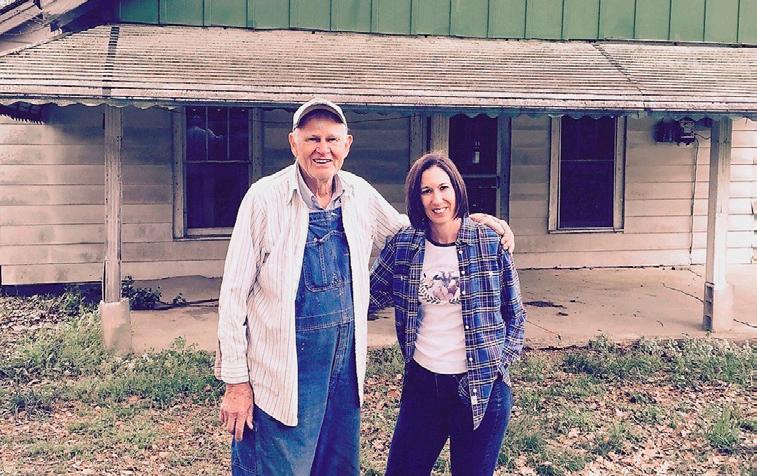
Billy’s father made biscuits for the family.
So, when you are driving along country roads and see old houses or barns in less-than-ideal condition, know that those old greying structures may have some tales to tell, if only we could
get them to speak to us.
Bob is director emeritus of the Milton Historical Society and a Member of the City of Alpharetta Historic Preservation Commission. You can email him at bobmey@bellsouth.net.

Pass the Kleenex; Spring is in the air
Pardon me if this one takes a little longer to read and to write.
I’ll be taking frequent breaks.
Hey, get your mind out of the toilet.
That’s not where I’ll be going.
No, the way we blazed through January and February like that proverbial hot knife through butter (why would anyone use a hot knife to prepare their morning toast? Wouldn’t that sear your fingers?) it’s time to beeline it for any type of medicine that will stop this early onset of spring.
Snort, sniff, cough, sneeze, enough water in your eyes to fill an Aquafina bottle. Then that “snorty” throaty sound that will get you thrown out of most restaurants.
Ahhh, springtime in the South.
As I’ve increased my tenure on this big
blue ball, it seems like the allergy gods are giving me just a little more to deal with than the previous year.
“You did okay with that ragweed last year,” those dastardly allergy gods must be saying. “Let’s see how many boxes of Kleenex you can blow through when we toss a heaping helping of mold and grasses your way.”
I can hear you saying: “Oh you big baby, just take a Zyrtec.”
Not a viable solution. A non-drowsy product claim to me means I can take one now and sleep until the last firework has exploded in early July.
Or you might be offering: “Quit complaining. Just go to the doctor.”
My response would be to tell you to go someplace, but it wouldn’t be to the doctor.
I have a crackerjack medical team that keep me on this side of the grass, but I try to frequent them as little as possible.
Having a sawbones yank out Lefty, my renal cell carcinoma-riddled left
kidney makes me a bit hesitant to mount a table and inquire: “OK Dr. Mellis (my outstanding urologist), what else can we tear out of there?”
In actuality, Dr. Mellis saved my life.
For now.
That’s the thing about cancer, those MRIs and chest X-rays can come back normal.
Until they don’t.
So, all this sneezing and snorting has made me deal with staring down those tests. It’s a rite I’ll probably deal with for the rest of my life.
And that’s fine with me. Getting old is a blast. I never thought there were some many ways to say “Oy vey” when I take those first steps in the morning.
The hits (cracks and pops) just keep on coming.
While the Braves get into playing shape, anticipating the opening of the season, I am absolutely giddy waiting for that letter from my gastroenterologist, Dr. Simon Cofrancesco, informing me of his interest in a different opening and that
it’s colonoscopy time again. Oh joy.
I think all this early spring is merely a tease. I’m banking on it getting cold a few more times. I’ll pray for anything so long as it will gets me out of playing in the dirt.
But there’s nothing quite as aesthetically pleasing to the eye as springtime here in the South. Friends in other parts of the country always ask: “Is Augusta National as beautiful in person as it looks on TV?”
No. It’s an optical delusión. Stay away. And you have a better chance of winning Powerball than ever sniffing around on that hallowed ground.
The Masters belongs to us Southerners. All that flora and fauna comes with a price that we pay every year. Gesundheit!!!
Mike Tasos has lived in Forsyth County for more than 30 years. He’s an American by birth and considers himself a Southerner by the grace of God. He can be reached at miketasos55@gmail.com.

Sandlot baseball in Sandy Springs
VALERIE BIGGERSTAFF
Baseball games were popular in Sandy Springs long before Morgan Falls Athletic Complex existed. The community had a sandlot team, sometimes referred to as the “Sandy Springs nine” in the Atlanta newspapers.
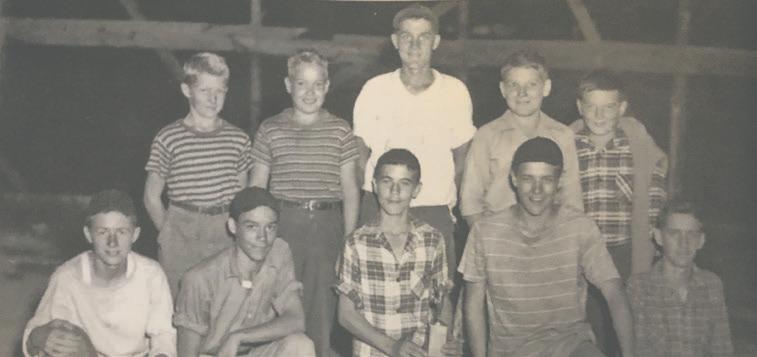
According to “Images of America Sandy Springs,” by Kimberly M. Brigance and Morris V. Moore, many games were played at an unofficial ballpark between Boyleston Drive, Hammond Drive, Mount Vernon Highway and Roswell Road.
Baseball had begun by 1934 in Sandy Springs, because an outdoor meeting and wiener roast was held in August of that year to plan and raise money for uniforms. (Atlanta Constitution, August 8, 1934)
Sandy Springs baseball was part of the Regenstein’s family life. They moved to 10 acres on Mount Vernon Highway in 1946. Robert Regenstein was an umpire at the baseball field. When his efforts to bring City of Atlanta water to Sandy Springs were successful in 1950, the community held a Fourth of July celebration, which included square dancing and baseball.
When Robert and Jean’s daughter Barbara was born, employees of
Regenstein’s store bought a baby-sized baseball uniform for her. The couple took Barbara to the Sandy Springs field in the uniform.
Scheduled league games for August 1, 1948, included Sandy Springs at Roswell and Alpharetta at Austell as part of the North Atlanta League; Dunwoody at Smyrna, State League; Irvindale Dairy vs. Tucker at Piedmont Park and Norcross at Duluth in the County League.
The Atlanta papers regularly reported on the various sandlot team results and the special achievements of the players.
Bill Hardigree of Sandy Springs was the fielding star of a game against the Federal Pen (Penitentiary) team. Sandy Springs won 7 to 4, and Hardigree got six of those seven runs. (Atlanta Constitution, “Hardigree Leads Sandy Springs, Sept. 17, 1951)
John Davis moved to Sandy Springs with his family in 1962 at the age of 10.
Little League baseball had recently become popular in the community.
“By the 1960s, baseball in Sandy Springs had taken on a life of its own and had become part of the town’s spirit, even if there was no official place to play it,” Davis recalled.
Local businesses and organizations sponsored teams, buying sports equipment and uniforms including Arlington Cemetery, the Optimist Club, Swofford Shoes, Northside Pharmacy, and Bondurant Sporting Goods. (Sandy Springs Gazette 2018, “Root, Root, Root for the Home Team”) Davis played on a team sponsored by Arlington Cemetery. He remembered the team marching down Roswell Road as part of a parade. The league played on fields at Mount Vernon Baptist Church and St. John United Methodist Church and at local elementary school fields.
In 1967, two parks were planned for the southern part of Fulton County in Palmetto and near Fairburn, and two parks in Sandy Springs, Hammond and Morgan Falls. The parks would have baseball fields and tennis courts. (Atlanta Constitution, March 30, 1967, “Four Parks Planned by Fulton”)
Award-winning author Valerie Biggerstaff is a longtime columnist for Appen Media. She lives in Sandy Springs. You can email Valerie at pasttensega@gmail.com or visit her website at pasttensega.com.
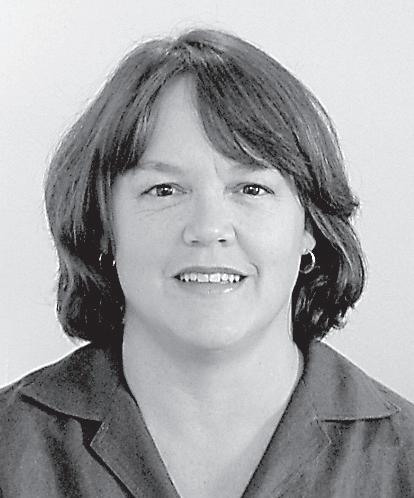
Insect allies: predators and parasitoids in the garden



It’s important to identify an insect in your garden before taking action. Are you sure it’s a “bad guy?”
Many insects are actually providing free pest management!
Natural enemies, insects that kill or suppress other insects, help control prey populations and keep nature in balance. There are two categories of natural enemies. A predator is an insect that captures and eats another insect (the prey). A parasitoid is an insect that develops on or inside another insect (the host). The host usually dies in the process of the parasitoid’s development.
Conserving Natural Enemies
Natural enemies need alternate food sources in addition to prey. While they’re out hunting, insect predators might need “snacks” to keep up their energy. Cue flowering plants! Flowers provide nectar and pollen that natural enemies use as supplemental food while hunting or if prey becomes scarce.
To keep natural enemies in the area, plant flowers with varying bloom times, providing food year-round. Native plants are especially pest-tolerant and supportive to natural enemies. Bonus: While drinking nectar and traveling between flowers, natural enemies become pollinators!
Natural enemies also need habitat where they can reproduce, take shelter and overwinter. Aim for structural complexity— variation in height, depth and texture—in your plantings to provide plenty of cover. Many overwinter in cavities, twigs and leaf litter, so “leave the leaves” where you can.
Some natural enemies, like lady beetles, can be purchased in bulk for release in the landscape. This is a short-term solution. The most sustainable way to reap the benefits of our insect allies is to attract and retain them with suitable habitat and food sources. It’s important to remember, natural enemies need prey! Don’t expect to eradicate all pests. It is impossible, and you will lose your natural enemies. Instead, aim to keep pest populations at tolerable levels.
Common natural enemies
Wasps
Most wasps are predators—they capture insects to feed to their larvae (immature wasps). Social wasps, like paper wasps and yellowjackets, live in colonies. Social wasps can be aggressive when their nests are disturbed but are generally docile while they are feeding on nectar. Many are generalist predators, eating a wide variety of different insects. Caterpillars, including
corn earworms, armyworms, loopers and hornworms, are popular prey.
Solitary wasps do not live in colonies. A female solitary wasp creates one or a few nests at a time for her developing larvae. She may build her nest in the soil, in a cavity or with mud. After she lays her egg inside, she hunts and delivers live (sometimes paralyzed) prey to her hungry larva once it hatches. Solitary wasps are rarely aggressive.
Parasitoid wasps are extremely beneficial and come in all sizes, from nearly microscopic “fairyflies” (0.5 mm) to giant ichneumon wasps (up to 5 inches). Most lay eggs directly inside aphids, whiteflies, scale insects, leafminers or caterpillars. The larvae hatch and feed inside the insect until they are ready to pupate, emerge as adults and fly away. Gruesome but cool!
Beetles
Lady beetles, or lady bugs, come in all sizes and colors, not only red with black spots. Adults and larvae eat a variety of garden pests, like aphids, mealybugs and whiteflies. Some larvae can consume 200500 aphids before they reach adulthood! Beetles in the family Carabidae, called ground beetles, are common in the garden. These generalists have long legs and powerful mandibles for chomping prey. Adults and larvae are often found hunting on or in the soil at night.
True Bugs
Insects in the order Hemiptera are known as “true bugs.” Some of our worst garden pests, including aphids, whiteflies and scales, and some of our most valuable
predators, are true bugs.
Insects in the genus Orius are called minute pirate bugs for their diminutive size (2-5 mm) and are predators of aphids, armyworms, thrips, spider mites and whiteflies. They can even deliver a pinch to unsuspecting humans. Assassin bug adults and nymphs (immature true bugs) use sharp beaks to pierce aphids, leafhoppers, caterpillars and Japanese beetles. Larger assassin bugs, like the wheel bug, should be handled with caution or not at all, as they can administer a powerful bite.
Flies
Hover flies and flower flies are predators of common garden pests, including aphids. Many species mimic wasps and bees but cannot sting. Robber flies are aerial predators of many insects, including other predators! Larvae feed on soft-bodied insects, like scales and mealybugs.
Flies in the family Tachinidae are parasitoids. Females lay eggs in or on host grasshoppers, Japanese beetles and stink bugs. Larvae feed on the host, leading to its demise.
Lacewings
Lacewings eat soft-bodied mites, aphids, mealybugs and scales. Look out for lacewings’ distinctive eggs, which are perched at the ends of long, graceful stalks.

You may also see mantids, or “praying mantises.” These insects are powerful ambush predators that capture a variety of different insects. Dragonflies may be in the garden if a pond or body of water is nearby. Dragonflies have excellent eyesight and can move each of their four wings independent-
ly, making them precise aerial hunters. They especially like mosquitoes and have earned the nickname “mosquito hawks.”
While spiders are arachnids, not insects, they are excellent predators that feed on a wide range of pests. Garden spiders build webs to capture their prey, while jumping spiders and green lynx spiders are ambush predators that pounce on unsuspecting insects.
Natural enemies are our allies in the garden, providing valuable pest control services and enhancing the complexity and wonder of our natural world. Next time you’re out in the garden, look closer. Is that a foe you see, or could it be a friend?
If you are interested in learning more about common insect predators in the garden and easy ways we can conserve them, please join me for a virtual talk on Sunday, March 19 at 2 p.m. To assure your place in the third class of the Spring 2023 Gardening Lecture Series presented by the North Fulton Master Gardeners, “Insect Allies: Predators and Parasitoids in the Garden,” please register at https://bit.ly/Spring2023NFMG-GardeningLectureSeries. The class will also be available for later viewing on the NFMG YouTube channel at youtube. com/northfultonmastergardeners.
Happy Gardening!
North Fulton Master Gardeners, Inc. is a Georgia nonprofit 501(c)(3) organization whose purpose is to educate its members and the public in the areas of horticulture and ecology in order to promote and foster community enrichment. Master Gardener Volunteers are trained and certified by The University of Georgia Cooperative Extension. Learn more at nfmg.net.
About the Author
This week’s guest Master Gardener columnist is Gabrielle LaTora, agriculture agent in Fulton County’s Extension office. An entomologist by training, Gabrielle is interested in insects on farms and in gardens and is passionate about closing the gap between people and their food. In addition to helping coordinate Fulton’s Master Gardener Extension Volunteer program, Gabrielle oversees the North Fulton Community Garden, answers clients’ questions about gardening and natural resources, works with urban farmers and delivers high-quality educational programs for Fulton County residents.

See solution Page 31



















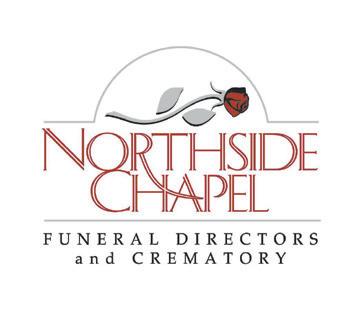
Free to read, not to produce.

AAPPEN PRESSCLU B
Since 1990 we have believed local news should be free to read and accessible by all. If you agree, consider making a pledge today. Go to appenmedia.com/join or mail a check to 319 N. Main Street Alpharetta, GA 30009

210 Ingram Ave. Cumming, 30040 770.887.2388
ingramfuneralhome.com



Our family serving your family since 1928. On site crematory • Serving all faiths
Offering: Burials • Cremation • Prearrangements Out-of-state transportation



















































































